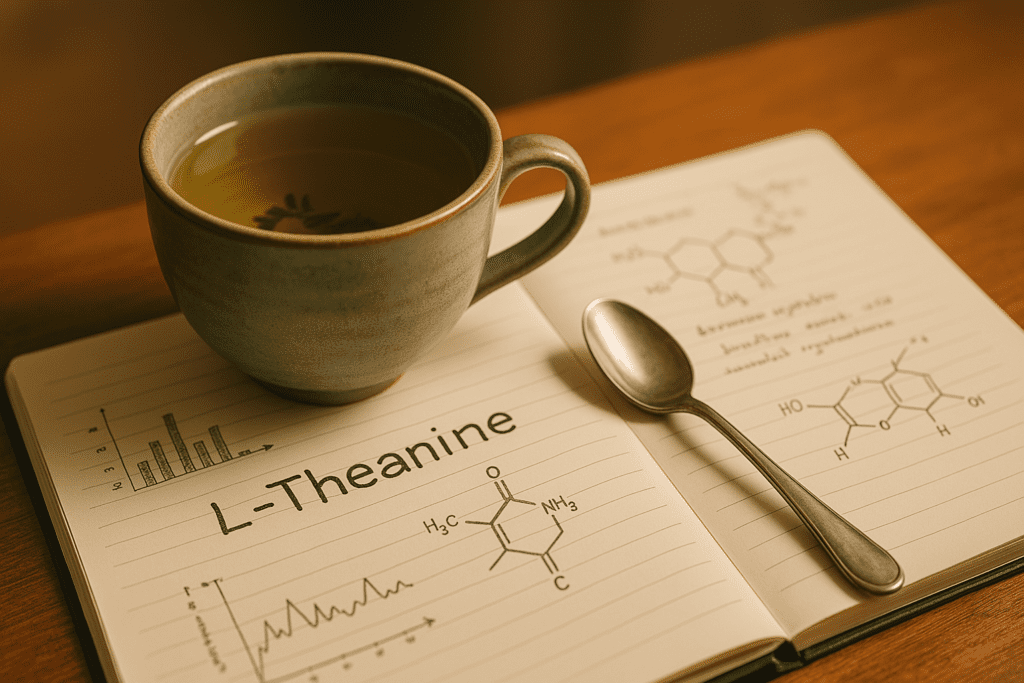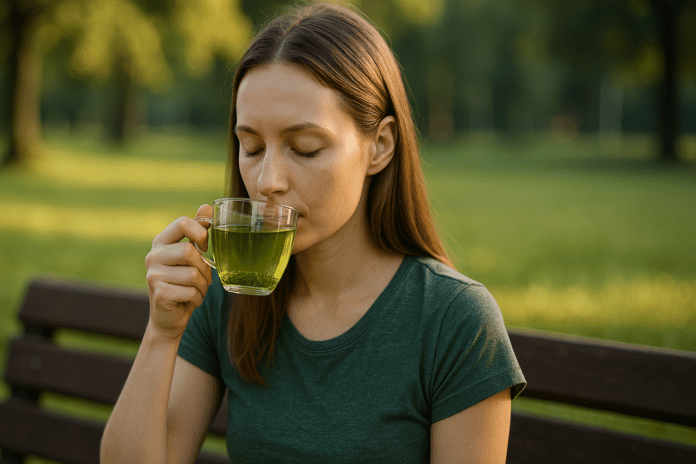For centuries, green tea has been revered not only as a soothing beverage but also as a tonic for the mind and body. As modern science delves deeper into the intricate biochemical properties of green tea, its relevance to brain health and longevity becomes increasingly evident. The unique interaction between caffeine and L-theanine — two of green tea’s primary active compounds — provides a synergistic effect that enhances cognitive function without the jitteriness often associated with other stimulants. In recent years, scientific inquiry has intensified around the optimal green tea caffeine to L-theanine ratio, particularly in relation to focus, mental clarity, and long-term brain resilience.
You may also like: Best Rated Nootropics for Brain Health: Top Supplements to Enhance Focus, Memory, and Longevity
The modern wellness movement has also sparked a surge of interest in natural nootropics, and green tea stands out as a prime example of a plant-based cognitive enhancer. This interest is not unfounded. Epidemiological studies, clinical trials, and mechanistic research all point to the multifaceted benefits of green tea on neurological function and healthy aging. As researchers and consumers alike ask, “How much L-theanine is in green tea?” and “What is the ideal green tea caffeine to L-theanine ratio for focus?”, it becomes crucial to understand the scientific basis behind these questions. By exploring the biochemistry, therapeutic applications, and long-term implications of teas with theanine, we can uncover how green tea supports both cognitive performance and anti-aging pathways.
The Biochemistry Behind Green Tea’s Mental Boost
Green tea’s ability to enhance mental clarity and sustained attention is largely attributed to its distinctive combination of caffeine and L-theanine. Unlike coffee, which delivers a sharp spike in energy followed by a crash, green tea offers a smoother, more balanced experience. Caffeine, a well-known central nervous system stimulant, increases alertness by blocking adenosine receptors, thereby reducing the sensation of fatigue. However, when consumed in isolation, caffeine may also heighten anxiety, restlessness, and elevated heart rate.
This is where L-theanine, a rare amino acid almost exclusively found in teas with theanine, plays a critical role. L-theanine crosses the blood-brain barrier and has been shown to increase alpha brainwave activity, a state associated with relaxed alertness and enhanced creativity. Furthermore, it modulates neurotransmitters such as GABA, dopamine, and serotonin, which influence mood, stress resilience, and focus. When paired with caffeine, L-theanine counteracts overstimulation while amplifying the positive effects on cognitive performance.
Clinical studies have repeatedly demonstrated that the combination of caffeine and L-theanine improves reaction time, task-switching accuracy, and mental endurance. In fact, the ratio of these two compounds may be just as important as their presence. The average green tea caffeine to L-theanine ratio ranges from 1:2 to 1:4, depending on the tea variety and preparation method. This means that for every 20 milligrams of caffeine, one might expect 40 to 80 milligrams of L-theanine, striking a balance that promotes calm focus without drowsiness.
How Much L-Theanine Is in Green Tea?
A common question among those seeking cognitive benefits from green tea is: how much L-theanine is in green tea, really? The answer is nuanced, as several factors influence the L-theanine content of a given cup. On average, a standard brewed cup of green tea (about 200 ml or 6.7 oz) contains between 6 and 20 milligrams of L-theanine. However, this amount can vary significantly depending on the specific cultivar, growing conditions, leaf processing, and steeping technique.
Matcha, for instance, a powdered form of green tea made from shade-grown leaves, typically contains higher levels of L-theanine compared to traditional steeped varieties. Shade-growing increases the theanine content by preventing its breakdown into catechins. Similarly, first-harvest teas such as gyokuro and sencha also tend to be richer in L-theanine. On the other hand, over-steeping or using water that is too hot can degrade L-theanine and reduce its availability.
Thus, to maximize L-theanine intake, choosing high-quality teas with theanine such as matcha or gyokuro and steeping them at lower temperatures (around 70°C or 160°F) for a short duration is advised. For those seeking a precise dosage for therapeutic or cognitive enhancement purposes, standardized L-theanine supplements derived from tea are also available. Nevertheless, understanding how much L-theanine is in green tea allows consumers to make informed choices about their cognitive wellness routine.
Decoding the Green Tea Caffeine to L-Theanine Ratio
When it comes to optimizing the cognitive benefits of green tea, the green tea caffeine to L-theanine ratio plays a pivotal role. As previously noted, this ratio typically falls between 1:2 and 1:4 in high-theanine tea varieties. The balance of stimulating and calming effects is essential for maintaining sustained attention without the drawbacks of overstimulation.
Scientific studies have shown that a caffeine to L-theanine ratio of 1:2 yields measurable improvements in working memory, attentional switching, and overall cognitive flexibility. For example, one double-blind, placebo-controlled trial found that participants who consumed 50 mg of caffeine paired with 100 mg of L-theanine demonstrated significantly better task performance and reduced susceptibility to distraction compared to either compound alone. This synergy not only supports peak mental performance but also enhances mood stability and stress resilience.
Understanding this balance can guide individuals in tailoring their tea consumption to match specific cognitive goals. For productivity-oriented tasks requiring alertness and sustained concentration, teas with theanine that naturally fall into the optimal ratio range are especially effective. For example, consuming 2-3 cups of matcha throughout the day can provide a steady influx of these synergistic compounds without disrupting sleep or triggering anxiety. Moreover, by adjusting preparation methods and selecting high-theanine varieties, it is possible to influence the green tea caffeine to L-theanine ratio in a personalized, strategic manner.
Teas with Theanine: Choosing the Best Varieties for Brain Health
Not all green teas are created equal when it comes to supporting brain health and longevity. Teas with theanine differ widely in their phytochemical profiles, depending on factors such as leaf maturity, cultivation techniques, harvest timing, and regional origin. For individuals specifically interested in cognitive enhancement and anti-aging benefits, selecting teas with a favorable green tea caffeine to L-theanine ratio is key.
Matcha stands out as a powerhouse in this regard. Because it is made from whole powdered leaves, matcha offers a concentrated dose of both caffeine and L-theanine. Moreover, its cultivation involves shade-growing, which significantly boosts L-theanine levels while also increasing chlorophyll and antioxidant content. Gyokuro, another shade-grown tea, is prized for its smooth umami flavor and high theanine concentration, making it a top choice for those seeking a calm yet focused mental state.
Other notable options include sencha and kabusecha, both of which offer moderate caffeine and theanine levels, making them suitable for daily consumption without overstimulation. For evening or relaxation-oriented use, houjicha (a roasted green tea with lower caffeine) still provides some L-theanine, albeit in smaller amounts. While black teas and oolong teas may also contain theanine, they generally offer lower concentrations than their green counterparts. Understanding how much L-theanine is in green tea varieties can empower consumers to select teas that align with their cognitive and longevity goals.

Long-Term Cognitive Benefits of Green Tea
Beyond its immediate effects on focus and mental clarity, green tea has demonstrated significant promise in supporting long-term brain health and cognitive longevity. Numerous epidemiological studies have linked regular green tea consumption with reduced risk of age-related cognitive decline, Alzheimer’s disease, and other neurodegenerative disorders. The mechanisms underlying these protective effects are multifactorial, involving antioxidant activity, anti-inflammatory modulation, and improved cerebral blood flow.
L-theanine in particular contributes to these outcomes by enhancing neuroplasticity, promoting neurogenesis, and protecting against excitotoxicity — a process whereby excessive glutamate damages neurons. The combination of L-theanine and caffeine also appears to mitigate the age-related decline in attention and working memory, possibly by preserving synaptic integrity and supporting cholinergic function. In addition, green tea polyphenols such as EGCG (epigallocatechin gallate) have been shown to cross the blood-brain barrier and combat oxidative stress within neural tissue.
In a longitudinal cohort study conducted in Japan, older adults who consumed at least one cup of green tea daily were significantly less likely to experience cognitive impairment over a seven-year period. Other trials have observed that teas with theanine not only improve mood and relaxation in the short term but also contribute to better sleep quality, reduced anxiety, and overall psychological well-being over time. These findings underscore the role of green tea as both a daily nootropic and a long-term ally in brain aging prevention.
Green Tea and Its Role in Anti-Aging and Longevity
The benefits of green tea extend far beyond cognitive performance. As a functional beverage, it plays a central role in anti-aging and longevity by modulating key biological pathways associated with aging. These include cellular senescence, inflammation, mitochondrial health, and DNA repair mechanisms. Compounds such as EGCG, catechins, and theanine work synergistically to protect cells from oxidative stress and inflammatory damage — two of the primary drivers of biological aging.
L-theanine contributes to this process by promoting parasympathetic nervous system activity, thereby reducing chronic stress and cortisol levels. Chronic stress is a known accelerator of aging, linked to telomere shortening and immune system dysregulation. By fostering a relaxed, balanced physiological state, L-theanine helps support homeostasis and resilience. Additionally, the green tea caffeine to L-theanine ratio promotes energy without taxing the adrenal system, in contrast to high-caffeine beverages that may lead to burnout over time.
Emerging research also suggests that regular intake of teas with theanine may influence longevity genes such as sirtuins and FOXO3, which are implicated in lifespan extension and metabolic health. Furthermore, green tea’s influence on glycation, lipid peroxidation, and arterial health contributes to its reputation as a cardiovascular protector. Altogether, these mechanisms illustrate why green tea is increasingly regarded as a cornerstone of anti-aging nutrition strategies.
Hormonal Balance and Neuroendocrine Health
The endocrine system, which regulates hormones, is deeply intertwined with both stress resilience and aging. Chronic stress can disrupt the hypothalamic-pituitary-adrenal (HPA) axis, leading to imbalances in cortisol, thyroid hormones, and sex hormones — all of which impact mood, cognition, and longevity. L-theanine appears to buffer the HPA axis by reducing cortisol spikes in response to acute and chronic stressors. This buffering effect is especially important for individuals dealing with high mental workloads or lifestyle-induced stress.
Caffeine, when paired with L-theanine in the right ratio, stimulates the adrenal glands in a more tempered manner, preventing the overproduction of cortisol and adrenal fatigue often seen with high doses of coffee or energy drinks. Over time, maintaining this hormonal equilibrium supports more stable energy levels, healthier sleep-wake cycles, and improved mood regulation. Teas with theanine thus provide a hormonally supportive alternative to harsher stimulants, particularly for those navigating midlife transitions or burnout.
Epigenetic Influence and Gene Expression
Recent advancements in epigenetics have begun to explore how lifestyle factors, including diet and supplementation, can influence gene expression without altering DNA sequences. Some evidence now suggests that green tea compounds, including L-theanine, may exert epigenetic effects that promote cellular health and longevity. These effects include the activation of protective genes like SIRT1 and FOXO3, which are associated with stress resilience, DNA repair, and extended lifespan.
The green tea caffeine to L-theanine ratio may play a role in this modulation by supporting consistent neural stimulation without inducing oxidative stress or inflammatory gene expression. In contrast to overstimulation from synthetic nootropics or high-dose caffeine, the balanced stimulation provided by green tea creates a favorable internal environment for beneficial gene expression. Over time, this could contribute to a lower biological age, improved cognitive reserve, and enhanced capacity for neuroplasticity.
Adaptogenic Potential and Resilience to Stress
Although not formally classified as an adaptogen, L-theanine exhibits many properties that align with this category. Adaptogens are substances that help the body adapt to physical, emotional, or environmental stressors by supporting homeostasis. L-theanine’s ability to promote alpha wave activity, enhance GABA signaling, and buffer cortisol suggests it may function as a cognitive adaptogen. When consumed in the context of green tea, it provides an adaptogenic effect that is both immediate and cumulative.
For individuals in high-demand environments — such as students, executives, healthcare professionals, and caregivers — teas with theanine offer a gentle yet effective tool for maintaining mental clarity and emotional balance. Unlike synthetic anxiolytics or stimulants, green tea supports resilience through natural modulation of the stress response. This makes it especially valuable for long-term use in promoting emotional stability, reducing burnout risk, and preserving cognitive function under pressure.

Practical Tips for Integrating Green Tea into a Cognitive Longevity Routine
For those interested in maximizing the brain-boosting and longevity-enhancing benefits of green tea, a few practical considerations can make a meaningful difference. First, choose high-quality, organic teas with theanine that emphasize shade-grown or first-harvest leaves. These varieties naturally contain higher levels of L-theanine and maintain a more favorable green tea caffeine to L-theanine ratio. Matcha, gyokuro, and kabusecha are excellent choices for focused mental tasks or mid-day energy boosts.
Second, pay attention to brewing techniques. Use lower water temperatures (160°F to 175°F) and shorter steep times to preserve L-theanine and prevent excessive caffeine extraction. For matcha, opt for ceremonial-grade powder and whisk it using traditional tools for optimal consistency and bioavailability. If caffeine sensitivity is a concern, spacing tea consumption earlier in the day or combining green tea with adaptogenic herbs can provide energy without overstimulation.
Third, consider cycling green tea consumption with L-theanine supplements during periods of high cognitive demand or stress. This allows for targeted dosing while maintaining the benefits of daily tea rituals. Finally, cultivate a mindful tea-drinking practice, using the act of brewing and sipping as a form of meditation that supports mental clarity and emotional balance. Such habits reinforce the neuroprotective and longevity-promoting potential of green tea over time.
Frequently Asked Questions: Green Tea, L-Theanine, and Cognitive Longevity
1. Can the green tea caffeine to L-theanine ratio be customized for different mental tasks?
Absolutely. While traditional teas with theanine offer a naturally balanced green tea caffeine to L-theanine ratio, emerging trends in cognitive enhancement now involve personalized tea blending or supplementation to match task-specific mental demands. For instance, a higher caffeine-to-theanine ratio may be more suitable for tasks that require rapid processing and high alertness, such as public speaking or test-taking. Conversely, a higher L-theanine proportion may benefit creative work or meditative focus, where relaxed awareness is more productive than high arousal. Tailoring the ratio allows individuals to take control of their neurochemical state based on the desired cognitive outcome, making green tea a versatile tool in both performance optimization and mental wellness.
2. How much L-theanine is in green tea compared to supplements?
While brewed green tea typically contains between 6 and 20 mg of L-theanine per cup, L-theanine supplements often offer standardized doses of 100 to 200 mg per capsule. This stark contrast can influence not only how theanine is absorbed but also how it interacts with caffeine. Teas with theanine provide a slower, more sustained release due to the matrix of plant compounds, whereas isolated supplements deliver a faster, sometimes more pronounced effect. Knowing how much L-theanine is in green tea helps set realistic expectations, especially when transitioning between natural consumption and supplementation. For those pursuing targeted therapeutic effects, supplements may offer precision, but tea rituals provide a holistic experience that engages multiple sensory and biochemical pathways.
3. What are the most advanced brewing techniques to optimize the green tea caffeine to L-theanine ratio?
Advanced brewing practices now focus on maximizing L-theanine while modulating caffeine levels to preserve the ideal green tea caffeine to L-theanine ratio. Techniques include using slightly cooler water (between 130°F and 160°F), shorter steeping times, and even cold brewing for 6 to 12 hours, which can preserve delicate theanine structures while reducing caffeine extraction. Some aficionados also employ dual-infusion methods where the first steep is discarded to remove excess caffeine, followed by a second, more theanine-rich extraction. Understanding how much L-theanine is in green tea under various brewing conditions is critical to optimizing both its taste and therapeutic impact. These practices are gaining traction among biohackers and health-conscious consumers who want to fine-tune their tea for mood and mental performance.
4. Do teas with theanine affect emotional intelligence and interpersonal dynamics?
Yes, recent investigations suggest that teas with theanine, especially when consumed regularly, may enhance emotional regulation and empathy. L-theanine promotes alpha brainwave activity, associated with calm awareness, which can improve active listening and reduce impulsive reactivity in emotionally charged situations. In social environments, a favorable green tea caffeine to L-theanine ratio can help reduce anxiety without inducing fatigue, supporting clearer communication and more grounded decision-making. While much of the current literature focuses on solo cognitive performance, emerging psychological research hints at green tea’s potential to foster emotional intelligence and group cohesion. This area is ripe for further exploration, especially in high-stakes environments like leadership, counseling, and education.
5. How does theanine from tea interact with pharmaceuticals or nootropic stacks? L-theanine interacts synergistically with both pharmaceutical medications and nootropic stacks, often enhancing benefits or reducing side effects. For instance, when paired with stimulant medications such as modafinil or Adderall, L-theanine can mitigate overstimulation and anxiety while preserving focus. Similarly, many cognitive enhancement regimens now intentionally combine synthetic or natural stimulants with teas with theanine to create smoother, more sustainable effects. Understanding how much L-theanine is in green tea can help individuals dose complementary nootropics appropriately to avoid unwanted interactions. However, as with all supplement-pharmaceutical combinations, it is critical to consult a healthcare professional for personalized guidance.
6. Are there any emerging forms of green tea designed to amplify L-theanine content? Yes, agricultural innovation has led to the development of specialty cultivars bred specifically for higher theanine concentrations. These are typically shade-grown under tightly controlled conditions and harvested at peak nutrient density, resulting in teas with theanine levels well above average. Some high-end Japanese teas, such as “Gokou” or select gyokuro strains, may contain L-theanine concentrations approaching 40 mg per serving. For consumers curious about how much L-theanine is in green tea of different origins, these cultivars offer a glimpse into the future of functional teas. Moreover, micro-lot and lab-verified batches now allow buyers to evaluate the exact green tea caffeine to L-theanine ratio, helping ensure consistency and therapeutic reliability.
7. Can green tea’s theanine support long-term creativity and innovation?
Long-term use of teas with theanine may nurture neural plasticity and divergent thinking, key components of sustained creativity. The calming-yet-alert state induced by L-theanine has been linked to better insight generation and pattern recognition, essential for problem-solving in fields like design, research, and entrepreneurship. Interestingly, the green tea caffeine to L-theanine ratio mimics the neurophysiological state often seen in flow states, where deep focus coexists with relaxation. Over time, this dual activation of the brain’s executive and default mode networks may facilitate more flexible thinking and resilience in the face of creative blocks. While further research is needed, anecdotal evidence from artists, writers, and tech developers supports the idea that regular consumption of L-theanine-rich tea can be a foundational part of an innovation-oriented lifestyle.
8. How can teas with theanine be incorporated into workplace wellness strategies?
Many companies are beginning to recognize the cognitive and emotional benefits of offering teas with theanine in office environments. Unlike high-caffeine beverages, green tea supports sustained attention without jitteriness or afternoon crashes, making it ideal for team productivity. Furthermore, the green tea caffeine to L-theanine ratio has been shown to improve mental flexibility and task switching, essential for multitasking roles. Office tea rituals can also double as micro-breaks that reduce stress and foster social connection. Employers who understand how much L-theanine is in green tea options can make informed choices about which blends to stock for different departments, tailoring wellness resources to meet both creative and analytical demands.
9. Are there lifestyle habits that can enhance the benefits of L-theanine in green tea?
Yes, combining teas with theanine with certain lifestyle practices can significantly amplify their cognitive and physiological effects. For instance, pairing green tea consumption with light physical activity, such as walking or yoga, may enhance vagal tone and improve the gut-brain connection. Similarly, mindfulness practices like breathwork or meditation can work synergistically with the calming properties of L-theanine to reduce cortisol and enhance neuroplasticity. Understanding how much L-theanine is in green tea allows users to time their intake alongside such activities for maximal effect. Over time, this combination of smart tea consumption and supportive habits can yield compounding benefits for mood, memory, and emotional resilience.
10. What are the ethical considerations when sourcing teas with theanine?
As demand grows for high-L-theanine teas, ethical sourcing becomes increasingly important. Many of the finest teas with theanine are shade-grown and hand-harvested, often under labor-intensive conditions. Supporting farms that use fair-trade practices and sustainable cultivation not only ensures better working conditions but also encourages biodiversity and soil health. Consumers should look for certifications and transparency around how much L-theanine is in green tea from different producers, as quality and ethical standards often go hand in hand. Ethical sourcing reflects a commitment not just to personal health, but also to global wellness, reinforcing the broader values that green tea has long represented in cultures worldwide.

Conclusion: Harnessing Green Tea’s Synergy for Brain Longevity and Focus
Green tea is much more than a pleasant beverage; it is a scientifically supported, neuroprotective ally that offers a cognitive edge through its unique blend of bioactive compounds. The delicate interplay between caffeine and L-theanine creates a synergy that enhances focus, memory, and stress resilience without the pitfalls of overstimulation. By understanding how much L-theanine is in green tea and leveraging the optimal green tea caffeine to L-theanine ratio, individuals can tailor their intake to meet both immediate cognitive needs and long-term health goals.
Moreover, teas with theanine provide a natural, sustainable approach to brain longevity, modulating stress, improving sleep, and protecting against age-related decline. As evidence continues to mount in favor of green tea’s role in anti-aging and cognitive health, incorporating it into one’s daily routine emerges as a practical, evidence-based strategy for enhancing mental performance and promoting graceful aging. In a world saturated with synthetic stimulants and quick fixes, green tea offers a time-tested, science-backed path to sustained clarity and vitality.
natural nootropics for focus, L-theanine benefits for brain, cognitive enhancement with tea, matcha brain health benefits, herbal remedies for anxiety, green tea for stress relief, adaptogens for mental clarity, tea and neurotransmitters, calming brain supplements, natural focus boosters, mood-enhancing teas, brain fog remedies, caffeine alternatives for energy, EGCG brain support, longevity nutrition strategies, anti-aging drinks, neuroprotective herbal compounds, healthy caffeine sources, amino acids for mental health, plant-based brain supplements
Further Reading:
The Cognitive-Enhancing Outcomes of Caffeine and L-theanine: A Systematic Review
Green tea effects on cognition, mood and human brain function: A systematic review
How Much L Theanine With Caffeine? The Ideal Caffeine L Theanine Ratio
Disclaimer
The information contained in this article is provided for general informational purposes only and is not intended to serve as medical, legal, or professional advice. While Health11News strives to present accurate, up-to-date, and reliable content, no warranty or guarantee, expressed or implied, is made regarding the completeness, accuracy, or adequacy of the information provided. Readers are strongly advised to seek the guidance of a qualified healthcare provider or other relevant professionals before acting on any information contained in this article. Health11News, its authors, editors, and contributors expressly disclaim any liability for any damages, losses, or consequences arising directly or indirectly from the use, interpretation, or reliance on any information presented herein. The views and opinions expressed in this article are those of the author(s) and do not necessarily reflect the official policies or positions of Health11News.


